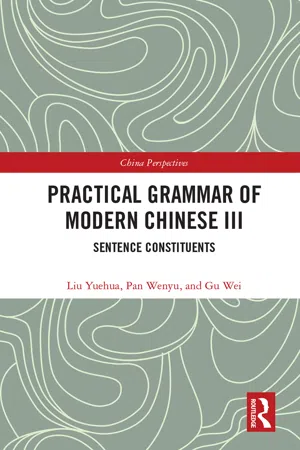
Practical Grammar of Modern Chinese III
Sentence Constituents
- 220 pages
- English
- ePUB (mobile friendly)
- Available on iOS & Android
About this book
Chinese grammar is characterized by its simple structure, lack of inflections, and wide use of monosyllabic morphemes. With the increased popularity of learning Chinese as a second language, there is a demand for a guide to Chinese grammar that's targeted at second language learners.
This four-volume set is one of the earliest and most influential works of Chinese grammar, with a special focus on teaching and learning Chinese as a second language. Drawing on rich teaching experience, the authors analyze a myriad of real world examples to describe Chinese grammatical phenomena and rules while introducing the general grammar system of Chinese. This volume introduces sentence constituents in modern Chinese grammar, including subjects, objects, attributes, adverbials, complements, double references, and parentheses.
Since the first edition came out in 1983, this set has been revised twice and remained one of the best sellers in the field. Practitioners and scholars of teaching Chinese as a second language, as well as students with a basic knowledge of Chinese, will find it to be a handy reference.
Frequently asked questions
- Essential is ideal for learners and professionals who enjoy exploring a wide range of subjects. Access the Essential Library with 800,000+ trusted titles and best-sellers across business, personal growth, and the humanities. Includes unlimited reading time and Standard Read Aloud voice.
- Complete: Perfect for advanced learners and researchers needing full, unrestricted access. Unlock 1.4M+ books across hundreds of subjects, including academic and specialized titles. The Complete Plan also includes advanced features like Premium Read Aloud and Research Assistant.
Please note we cannot support devices running on iOS 13 and Android 7 or earlier. Learn more about using the app.
Information
1
Subjects and predicates
Section one: features of subjects and predicates
- In a conversation or continuous utterances Example 13A: 那个人的照片你看过了吗? [nà gè rén de zhào piàn nǐ kàn guò le ma?](Have you seen that man’s photo?)B: 看过了。 [kàn guò le.]B: (Yes, I have.)A:喜欢吗? [xǐ huān ma?](Do you like it?)B: 长得不错。 [zhǎng dé bú cuò.](He is good looking.)Example 14 我今天上午去北海划了两个钟头船, 下午又去操场打了一 场球, 所以很累。 [wǒ jīn tiān shàng wǔ qù běi hǎi huá le liǎng gè zhōng tóu chuán, xià wǔ yòu qù cāo chǎng dǎ le yī chǎng qiú, suǒ yǐ hěn lèi.](I went boating in Beihai for two hours this morning and played a ball game on the playground this afternoon, so I was very tired.)
- In the imperative sentenceIn an imperative sentence, the subject can be present or absent.Example 15 劳驾, 让开点儿。 [láo jià, ràng kāi diǎn er.](Excuse me. Step aside please.)Example 16 快去开门。 [kuài qù kāi mén.](Open the door quickly.)In a certain context, the predicate verb or object can be absent, too.Example 17A: 黑板上的字是谁写的? [hēi bǎn shàng de zì shì shuí xiě de?](Who wrote these words on the blackboard?)B: 我。 [wǒ.](It’s me.)Example 18A: 玻璃是谁打破的? [bō li shì shuí dǎ pò de?](Who broke the window?)B: 张小明。 [Zhāng Xiǎo míng.](Zhang Xiaoming.)Example 19A:下星期, 咱们老校友在北京聚会, 你参加吗? [xià xīng qī, zán men lǎo xiào yǒu zài běi jīng jù huì, nǐ cān jiā ma?](We alumni will gather together in Beijing next week. Will you join us?)B: 参加。 [cān jiā.](Yes.)A: 在哪儿? [zài nǎ er?](Where shall we meet?)B: 未名湖畔。 [wèi míng hú pàn.](By the lakeside of Weiming Lake.)
Section two: words or phrases as subjects
I. Nouns (phrases) or pronouns
Table of contents
- Cover
- Half Title
- Series Page
- Title Page
- Copyright Page
- Contents
- 1 Subjects and predicates
- 2 Objects
- 3 Attributes
- 4 Adverbials
- 5 Complements
- 6 Double references and parentheses
- Bibliography
- Index